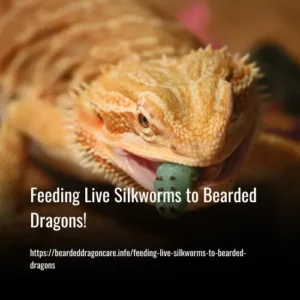Bearded dragons are fascinating reptiles that make great pets. They are omnivores, which means they can eat both plants and animals. However, not all plants are safe for them to consume.
One popular herb that many bearded dragon owners wonder about is cilantro. In this article, we will answer the question “Can bearded dragons eat cilantro?” and provide you with all the information you need to know about feeding your pet this herb.

Can Bearded Dragons Eat Cilantro
Bearded dragons can eat cilantro, and it can be a healthy addition to their diet. Cilantro is rich in vitamins and minerals, including Vitamins A, C, and K, and contains antioxidants and phytochemicals that can benefit their health.
However, it should be given in moderation to avoid gastrointestinal upset. If you’re unsure about how much cilantro to give your bearded dragon, consult with your veterinarian for advice.
Is Cilantro Good for Bearded Dragons
Cilantro can be given to bearded dragons as an occasional addition to their meals, but it’s not the most nutritious green food. Cilantro contains antioxidants, vitamins A and C, vitamin K, potassium, fiber, and water.
However, too much potassium and water can cause health issues such as diarrhea, high blood pressure, and kidney damage. It’s best to introduce cilantro to bearded dragons in small amounts.
Nutritional Benefits of Cilantro for Bearded Dragons
Cilantro can be a beneficial addition to a bearded dragon’s diet in small amounts. It contains water, protein, lipids, sugars, iron, calcium, fiber, vitamin C, and potassium. Cilantro also has antioxidants and vitamin K, which aid in healing and tissue maintenance.
Its high calcium to phosphorus ratio is valuable in preventing metabolic bone disease. However, too much cilantro can cause diarrhea due to its high water content and low nutritional value. It should be given as a treat rather than a staple food.
Nutritional Value of Cilantro
100 Grams of fresh [Raw] Cilantro leaves contain the following:
| Nutrients in Cilantro | Amount |
|---|---|
| Water | 92% |
| Vitamin A | 6748 IU |
| Vitamin C | 27mg/100g |
| Calcium | 67mg/100g |
| Sugar | 0.87g/100g |
| Phosphorus | 48mg/100g |
| Protein | 3g/100g |
| Ca:P Ratio | 1.4:1 |
Health Benefits of Cilantro for Bearded Dragons
Cilantro, also known as coriander, is a great addition to a bearded dragon’s diet as it provides various essential vitamins and minerals. Here are the benefits that bearded dragons can get from eating cilantro:
1. Calcium
Calcium is crucial for a bearded dragon’s strong bones and teeth. While cilantro does not contain a large amount of calcium, a 10-gram serving of cilantro can provide about 0.7 mg of calcium. Feeding your bearded dragon cilantro regularly can help improve its calcium intake.
2. Vitamins A and C
Cilantro is also a good source of vitamins A and C. A single serving of cilantro contains about 40% of the daily requirement of vitamin A and 11% of the daily requirement of vitamin C (in humans). These vitamins are essential for maintaining healthy eyesight, skin, teeth, bones, cell growth, reproduction, and strengthening the immune system.
If your bearded dragon has a calcium deficiency, it may show signs such as stunted growth, loss or change in coloration, lethargy, and even indigestion. It’s important to monitor your bearded dragon’s health and provide a balanced diet that includes cilantro greens.
3. Vitamin K
Cilantro is a good source of vitamin K, which is essential for blood clotting and repairing damage caused by cuts or wounds. A serving of cilantro contains about 0.06 mg of vitamin K. Signs of vitamin K deficiency in reptiles include poor growth, lethargy, and pale coloration.
4. Antioxidants
Cilantro is also a good source of antioxidants, which can help fight against cancer cells and oxidative stress. Oxidative stress occurs when there are too many harmful molecules in the body, caused by exposure to pollution, smoke, radiation, and certain foods. The antioxidants in cilantro can help lower the long-term health risks associated with high levels of oxidative stress.
5. Potassium
Cilantro is also a good source of potassium, which can help regulate blood pressure levels. However, too much potassium can lead to health problems for bearded dragons such as high blood pressure or kidney damage. Regular consumption of cilantro can provide your reptile with the right amount of potassium they need for their diet.
6. Fiber
Fiber is essential for digestive health, and cilantro contains it in abundance. It can help regulate digestion and give your bearded dragon a feeling of fullness after eating the herb. If your bearded dragon is suffering from poor digestion due to a diet of insects alone, supplementing their diet with cilantro greens can help.
7. Water
Fresh cilantro is an excellent source of hydration for your reptile as it contains 90% water. Adequate hydration is crucial for a bearded dragon’s health, as dehydration can lead to problems such as kidney stones, renal failure, and even death. A hydrated lizard will also be more active and have a better appetite than one that is not hydrated enough.
Overall, cilantro may not be the most appealing food for your bearded dragon, but it contains essential vitamins and minerals that can help improve their health and well-being.
8. Healthy Calcium to Phosphorus Ratio
Cilantro is a good source of calcium and phosphorus for bearded dragons, with a healthy ratio of more calcium than phosphorus.
It is important to maintain a ratio of 4:1 of calcium to phosphorus to prevent metabolic bone disease, which can cause symptoms such as loss of appetite, difficulty breathing, weakness/paralysis on one side of the body, and seizures.
Feeding your bearded dragon cilantro can help maintain a healthy calcium to phosphorus ratio and prevent these health issues.
Potential Dangers of Cilantro for Bearded Dragons
While cilantro is generally safe for bearded dragons, it does have some potential dangers. Its high water content can cause overhydration and diarrhea, which can lead to dangerous dehydration. Additionally, the calcium-to-phosphorus ratio in a bearded dragon’s diet should always favor calcium to avoid health risks like kidney stones and metabolic bone disease.
Cilantro does meet this criterion, as it contains decent amounts of both calcium and phosphorus. However, it should still be fed in moderation to avoid any potential health risks.
Can Bearded Dragons Eat Cilantro Everyday
Bearded dragons can eat cilantro occasionally, but not everyday. While cilantro is a good source of vitamins and minerals, it should only be given in small amounts every few days as too much can lead to digestive issues. Cilantro should also never be a major part of the bearded dragon’s diet and should only be used as a treat.
Other herb alternatives to cilantro include thyme, sage, and mint. Bearded dragons require a balanced diet of both plant and animal matter, with 20-25% protein and a salad of some kind after 18 months of age. Tomatoes can also be beneficial in small amounts, but too much can cause stomach problems and weight gain. Moderation is key for a healthy bearded dragon.
How Often Can Bearded Dragons Eat Cilantro
Bearded dragons should only be fed cilantro 3-4 times a week as it contains a lot of water that can cause diarrhea. It should not be a staple in their diet as it lacks calcium. Juveniles may enjoy it more than adults, but be careful not to overfeed. Do not mix it with sugary or starchy foods.
Bearded dragons do not need any dietary supplements beyond live insects. Sprinkle a little cilantro on their salad to diversify their food, but avoid feeding them too much of the same greens.
How Much Cilantro Can a Bearded Dragon Eat
It’s best to start with a small amount of cilantro to see if your bearded dragon likes it. Generally, you can feed them 5-8 cilantro leaves in one serving, along with other herbs or greens. Make sure to wash the leaves before feeding, and chop them finely to prevent choking.
The amount may vary based on the size of the bearded dragon, with baby beardies getting 2-3 leaves every 3-4 days and adult dragons getting around 8 leaves.
How to Feed Cilantro to Your Bearded Dragon
Cilantro is a great source of nutrition for your bearded dragon, but it’s important to prepare and serve it properly to ensure their health and safety.
1. Always Go Organic
It’s important to use organic cilantro or any other leafy green when feeding your bearded dragon. Non-organic produce is often treated with pesticides that can harm your pet, and bearded dragons are especially sensitive to these chemicals. So always go organic!
2. Wash the Cilantro
Before serving cilantro to your bearded dragon, it’s crucial to wash it thoroughly to remove any dirt or pesticide residues that could be harmful to your pet.
3. Chop the Cilantro
Chop the cilantro into small pieces that your bearded dragon can easily eat. This will also help prevent choking and ensure that your pet can digest the cilantro properly.
4. Add to Food Bowl
Add the chopped cilantro to your bearded dragon’s food bowl, making sure to mix it in with their other food to encourage them to eat it.
5. Observe Your Bearded Dragon
Observe your bearded dragon to make sure they’re eating the cilantro and not just picking around it. This will help you ensure that your pet is getting the proper nutrition they need.
6. Remove Uneaten Cilantro
After a few minutes, remove any uneaten cilantro from the food bowl to prevent bacteria growth and keep your pet’s enclosure clean.
7. Clean the Food Bowl
Thoroughly clean the food bowl after each feeding to prevent the growth of bacteria and remove any leftover food from your bearded dragon’s enclosure to prevent mold and fungus growth. This will help ensure your pet’s health and safety.
Can Bearded Dragons Eat Cooked Cilantro
It is not recommended to feed cooked cilantro to bearded dragons because it can cause digestive problems due to its high moisture content. Cooked cilantro also loses most of its nutritional value, so it is not a good source of nutrients for your pet.
However, if it’s very hot and cilantro is the only vegetable available, you can cook and feed it to your bearded dragon to help keep them hydrated temporarily. It’s best to only use this as a last resort and to provide them with their staple food as soon as possible.
Can Bearded Dragons Eat Frozen Cilantro
Bearded dragons can eat frozen cilantro, but it should be completely thawed before feeding it to them. It is not recommended to give them too much frozen cilantro as it can cause diarrhea due to its high moisture content. It is also not safe to feed them frozen cilantro straight from the freezer as it can increase the risk of choking.
Can Bearded Dragons Eat the Stems of Cilantro
Yes, bearded dragons can eat the stems of cilantro. However, it’s best to cut them into smaller pieces before feeding them to your pet. Feeding them the entire stem could be difficult for the beardie to chew and could pose a choking hazard.
Alternatives to Cilantro for Bearded Dragons
If your bearded dragon doesn’t like cilantro, there are other safe alternatives that you can feed them. Some examples include collard greens, kale, mustard greens, turnip greens, and dandelion greens.
These leafy greens contain a variety of nutrients that can benefit your pet’s health. Feeding a variety of greens to your bearded dragon is important to ensure they get all the nutrients they need.
FAQs
Can Bearded Dragons Eat Coriander Leaves?
Yes, bearded dragons can eat coriander leaves, also known as cilantro. It’s a safe and healthy choice for them as it contains no toxic chemicals and has a high water content. Just make sure to wash the leaves thoroughly before feeding them to your dragon.
How Can Bearded Dragons Eat Cilantro?
To feed your bearded dragon cilantro, make sure it’s fresh and organic if possible. Wash it thoroughly and chop it finely before mixing it into a salad with leafy greens or serving it alone. Some bearded dragons love cilantro and will eat it without any other veggies.
Is Cilantro Safe For Bearded Dragons?
Cilantro is safe for bearded dragons to eat, but it should be given to them in moderation. Too much cilantro can cause digestive problems and Hypervitaminosis A, which is a common disease in captive reptiles. Cilantro is rich in vitamin A, so it’s important to feed it to bearded dragons in limited amounts to avoid health issues.
How Do I Cut Cilantro For My Bearded Dragons?
To feed your bearded dragon cilantro, make sure to wash it first. Remove the leaves from the stems and cut them into small pieces to avoid them getting stuck in your beardie’s throat while they eat. Doing this will help keep your bearded dragon safe and healthy.
How Can I Serve Cilantro to My Bearded Dragon?
You can serve raw cilantro to your bearded dragon once or twice a week, but make sure to supplement it with other calcium-rich greens. Avoid the chewy stems and only give them the leaves, chopped into small pieces and mixed with other leafy greens. Use organic cilantro and wash it thoroughly to avoid any harmful chemicals. Cooking cilantro removes many of its nutrients, so it’s best to serve it raw.
Conclusion
In conclusion, bearded dragons can definitely eat cilantro as part of their diet. Not only is it a tasty treat for them, but it also provides a range of nutritional benefits. Just remember to feed it in moderation and always check with your veterinarian if you’re unsure about any aspect of your bearded dragon’s diet. With a little bit of research and care, your bearded dragon will be one healthy and happy reptile!


